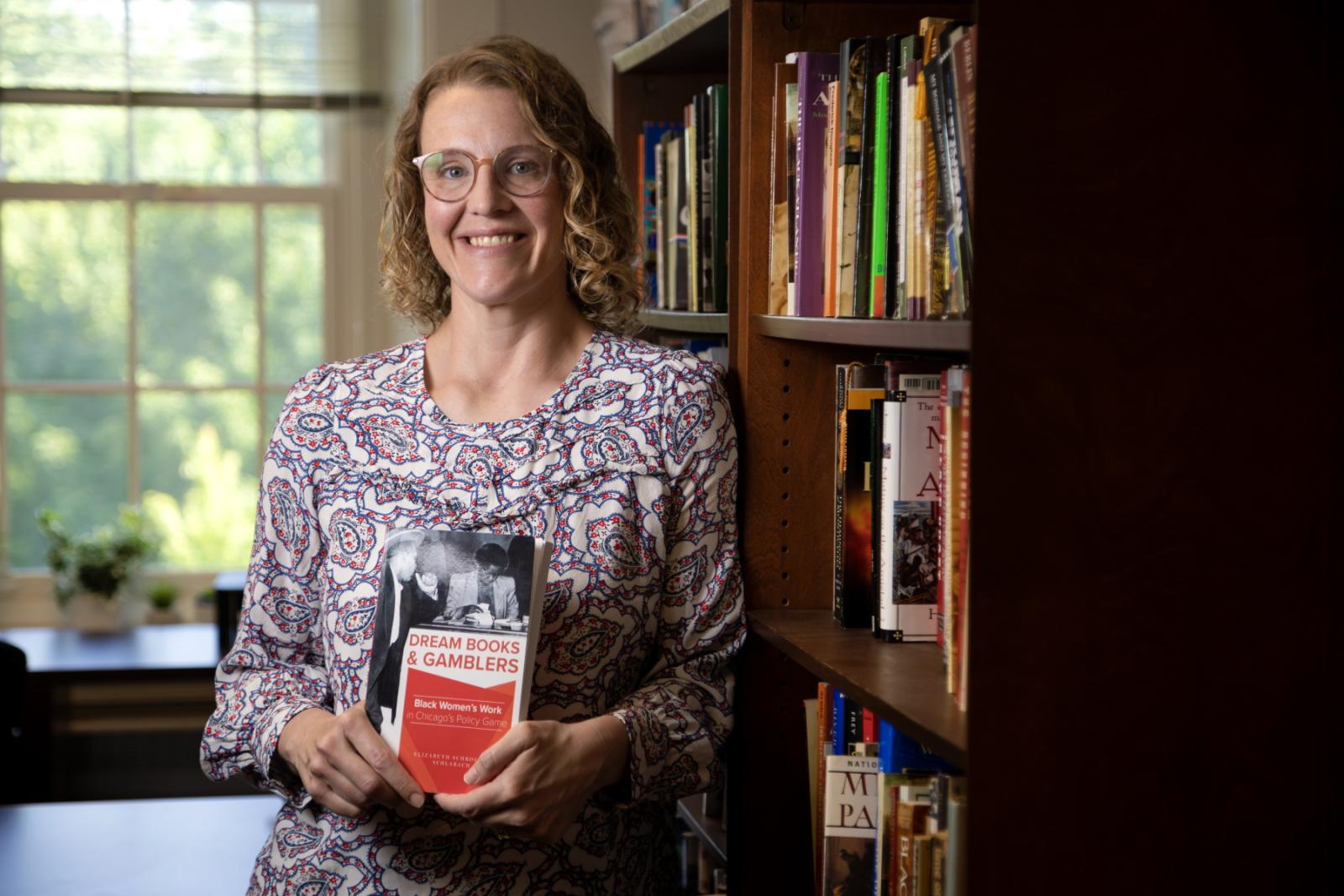Betsy Schlabach is celebrating both her new book and a travel grant.
“2022–2023 has been pretty good to me, I have to say,” the Lawrence University associate professor of history said.
With the grant, Schlabach hopes to visit the John Hope Franklin Research Center at Duke University, an archive housing more than 1,000 oral history recordings about life in the Jim Crow South.
“This project is pivoting my interest from the North to the South, while keeping it urban,” said Schlabach.
These plans continue the themes of Schlabach’s recent book, Dream Books and Gamblers: Black Women’s Work in Chicago’s Policy Game, published by the University of Illinois Press in November. The book focuses on policy gambling, a type of illegal lottery popular in pre-1970s Chicago where bettors had the freedom to choose which numbers they played.
“It’s sort of like Powerball today where you could pick any combination,” said Schlabach.
Before Illinois legalized lotteries in the 1970s, numbers stations were everywhere in Chicago’s Bronzeville neighborhood, where most African American residents were forced to live. The wealthy, philanthropic leaders of these policy games were called “policy kings.”
Immerse yourself in different times and places to develop important perspectives on the world past and present.
Schlabach said despite her longtime research on Bronzeville, she had previously dismissed these mysterious policy kings as a type of mafia. Finding records of these policy kings funding the local arts, however, inspired her to learn more.
“I thought to myself, ‘Well, if there are kings, there have got to be queens,’” Schlabach said. “People in Black Chicago really didn’t frown upon these gambling kings and queens because they donated so much money to the community.”
Schlabach said since African American women in these informal economies are usually ignored by other historians, her goal in this book was to highlight these women, share their stories, and argue for the validity of their work.
“Illegal or off-the-books labor was a valuable strategy that Black women deployed in the face of racism and sexism,” said Schlabach.
She said white and Black newspapers and media of the time portrayed the gambling industry differently. Schlabach said even within the Black community, there was disagreement over the validity and morality of the industry.
For many Black women, however, Schlabach argues it was a way to put food on the table. Many of these policy kings and queens even became extremely wealthy and influential despite the hardships and prejudice of the Jim Crow era, owning villas in Paris, Mexico City, and Peoria.
“I think it’s so interesting to try and piece the primary sources together into a story that might possibly do justice to what these women accomplished,” said Schlabach. “I like that challenge of being authentic to what they’re telling us in the primary sources.”
Research in unconventional spaces
When researching a historically silenced population, you have to look in unconventional places. Schlabach said much of her information came from arrest records.
“I had never really done a lot of legal or carceral history,” Schlabach said. “It was so interesting, but also really heavy, though. You’re looking at people’s lives and their run-ins with the police, which has a terrible history of African Americans being pursued relentlessly by the police.”
Schlabach said the Chicago Public Library, the National Archives, and the Cook County Circuit Court Archives were her biggest sources of information.
“Those were tough research sessions, but it was really incredible just to see how people persevered in the face of such relentless scrutiny by the police,” she said.
With the book published and a travel grant secured, Schlabach said she’s going on sabbatical this fall to research Black women’s work in the informal economies of Southern cities.
“If you’re going to study these cities, you need to go to these cities and be immersed in these cities’ archives,” she said. “This travel grant will help me do that.”
By traveling to the John Hope Franklin Center and listening to the oral histories stored there, Schlabach hopes to plan her next move.
Schlabach is even hoping to combine her findings from this project and her future Duke visit into her new course in Winter Term of 2024, The History of Black Business.
“I think for now, I’ll try to gather as much info as I can, read the secondary literature like I always tell my students, and see if I can get some writing done in the fall,” she said.
Staying true to research, writing
Schlabach said even when writing about a fascinating topic like this, the process is difficult.
“Writing a book like this is exhausting; it can be very isolating because it’s just you, your thoughts, and your computer,” she said.
Nevertheless, Schlabach said she still loves the process. Her advice for aspiring authors is to cultivate the habit of writing daily and using time well.
“Read the secondary literature,” she said. “Make sure you know what’s been said already in the field. Consult the experts widely and often. Just take your time enjoying the primary sources. Really listen for and hear what those documents are trying to tell you. Finally, revise, revise, revise.”
Schlabach said Lawrence has been a fantastic help along the way.
“The History Department has been really supportive,” she said. “We have a weekly writing group that meets and presents what we’re working on. That kind of accountability with my colleagues in the department is great.”
Schlabach is also a founder and member of the Humanities Research Group. With funding from the provost’s office, Schlabach and other members present their work each month.
“The people here are really receptive to the work that professors produce, and there’s an enthusiasm for that on campus that I’d like to see continue and grow,” Schlabach said.



